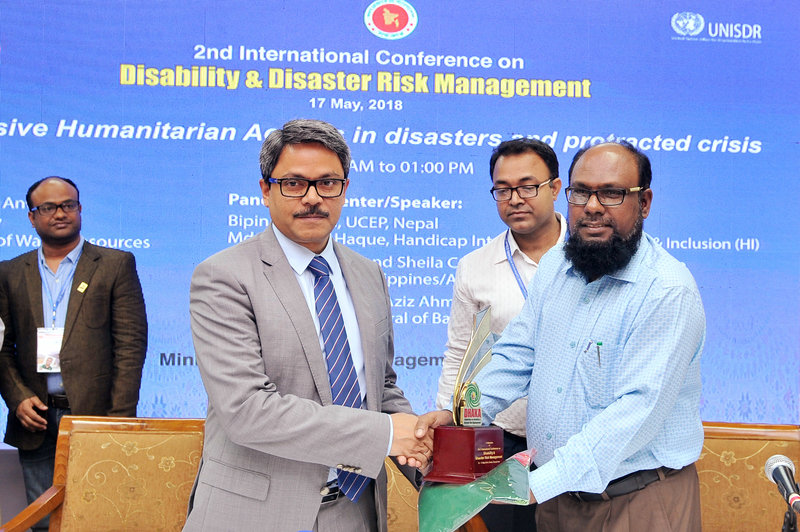Statement by Hon’ble State Minister for Foreign Affairs as Chief Guest of the Session on ‘Inclusive Humanitarian Actions in Disasters and Protracted Crisis’ at the 2nd International Conference on Disability & Disaster Risk Management

17 May 2018; 1130-1300 hrs at BICC
Distinguished Panelists,
Ladies and Gentlemen,
I am happy to be here. Let me thank Ministry of Disaster Management and Relief for organizing this Conference on a very important topic.
The notion of inclusive humanitarian actions responds to a wide range of needs and priorities of all people affected by crisis regardless of their age and status. ESCAP reports reveals that at least 6 per cent of all people affected by disasters acquire a physical, cognitive or psychological disability. The Sendai Statement stresses that disability inclusion in disaster risk reduction is critical for the creation of resilient, inclusive and equitable societies.
The long history of natural disaster in Bangladesh has enriched us with the wealth of experience in preparing for, and responding to, disaster events. Today, Bangladesh is recognized as a leader in adopting a more holistic approach to disaster management and risk reduction.
Our aim is to reduce the risk of people, especially the poor and the disadvantaged, from the effects of natural, environmental and man-made disasters, to a manageable and acceptable humanitarian level. We are now able to respond quickly by strengthening preparedness mechanisms and creating stock of relief materials event at local level. Prime Minister Sheikh Hasina is determined to build a resilient nation pursuing the principle "No more death in disaster”. Our efforts in this regards is based on an ‘inclusive approach’.
Distinguished participants,
Man-made, security related emergencies like conflict and forced deportation have irreversible effect on persons with disabilities. Such incidences also inflict disability in various ways. Both the Hyogo Framework and Sendai Framework have included disabilities. But they have fallen short in addressing and recognizing persons with disabilities inflicted and affected by conflicts and forced deportation.
Ladies and Gentlemen,
The recent crisis in the Rakhine State of Myanmar has caused a massive influx of forcibly deported Rohingya population to Bangladesh. The Government and people of Bangladesh showed tremendous generosity and hospitality to them with much needed humanitarian assistance. Bangladesh has set an example for the rest of the world by providing these people in distress with food, shelter and other humanitarian services graciously, despite many limitations.
The government - the central part of this humanitarian response- has been making joint efforts with international and humanitarian communities to deliver support to these people. To do so in a coordinated manner, the government has engaged all relevant Ministries and Departments and collaborating with UN and other agencies in multi-sectoral needs assessments, consultations and strategic planning. A National Task Force, led by the Ministry of Foreign Affairs, gives policy directives for the overall coordination of the Rohingya response measures in an inclusive manner. The Ministry of Disaster Management and Relief has been coordinating the response on the ground with the support from the Bangladesh Army and Border Guard Bangladesh. The Refugee, Relief and Repatriation Commissioner (RRRC) and the Deputy Commissioner of Cox's Bazar district have been playing critical role in the day-to-day coordination.
Distinguished Audience,
In these humanitarian actions, the government has prioritized focusing on basic needs of the forcibly displaced Rohingya population, lifesaving assistance, their well-being and dignity as well as restoration of the severely damaged environment in the areas and surroundings. We are also mindful about the importance of confidence-building between the displaced population and host communities. We are trying to address these issues through various measures and sectoral plans to ensure the uninterrupted socio-economic development of the District with the support of the local communities.
Resource mobilization remains crucial not only to meet life-saving and humanitarian needs of the displaced population but also the acute needs of host communities. Despite its resilience in the face of adversity, the Rohingya population remains critically vulnerable. We need to devise targeted interventions to address their humanitarian needs till return to their homes in Myanmar with appropriateness of services for all ages, genders and abilities.
Ladies and Gentleman,
Bangladesh has shown its highest commitment to humanitarian response through inclusive actions for the Rohingya people sheltered temporarily in Bangladesh. We are also working closely with our international and development partners to improve it further, so that they can be re-integrated easily when they return to their homeland in Myanmar. We stand ready to share our bit of experience in disaster preparedness, management and risk reduction with others.
I thank you all.
Joy Bangla, Joy Bangabandhu








